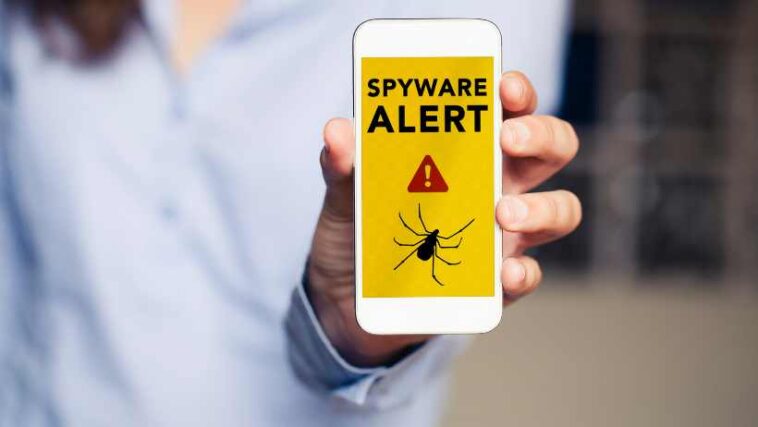A recent development involves the issuance of a directive by the United States Cybersecurity and Infrastructure Security Agency (CISA), which urges government agencies to implement security measures on their iPhones to protect against potential spyware attacks. CISA has issued directives for federal agencies to apply security patches to their iPhones in order to protect against vulnerabilities that may be exploited in zero-click attacks aimed at installing spyware that the NSO Group has developed.
Zero-click assaults are characterized by the absence of user interaction, rendering them exceptionally perilous. The BLASTPASS attack, so named by researchers at Citizen Lab, entails the dissemination of malevolent PassKit attachments via iMessage to specific targets.
The susceptibility permits arbitrary code execution on iPhones operating iOS 16.6 that have been completely patched. In light of the potential vulnerability to unauthorized access by sophisticated hackers to personal information and communications, it is critical that iPhone users promptly install security updates and contemplate implementing supplementary precautions like Lockdown Mode.
Government agencies have been instructed to protect iPhones from spyware attacks (BLASTPASS).
A recent development involves the issuance of a directive by the Cybersecurity and Infrastructure Security Agency (CISA) of the United States to federal agencies. The directive urges these agencies to promptly implement measures to safeguard their iPhones from potential spyware attacks. Without user intervention, spyware can be installed on the device through these “zero-click attacks,” which exploit vulnerabilities in the iOS operating system.
The targeted attack is referred to as BLASTPASS and it consists of nefarious PassKit attachments transmitted through iMessage. This extensive article will provide a detailed examination of zero-click attacks, the BLASTPASS attack, the NSO Group responsible for it, the capabilities of Pegasus, and the recent emergency security updates released by Apple.
An zero-click assault is what?
A zero-click attack is a form of cyber assault in which the user is not required to take any action in order for it to be successful. In general, malevolent actors depend on users launching harmful files or accessing perilous hyperlinks in order to commence an assault. Conversely, a zero-click attack obviates the necessity for the user to execute any action. Such assaults are exceptionally perilous and challenging to identify due to the fact that they can be carried out inaudibly and without the user’s awareness.
The BLASTPASS assault specifics
The BLASTPASS assault, which exploits iOS vulnerabilities, was identified by the researchers at Citizen Lab. It requires no user intervention. It entails the intended recipient receiving malicious PassKit attachments containing images from the iMessage account of the perpetrator. It is recognized that fully patched iPhones running iOS 16.6 are susceptible to a buffer overflow vulnerability when processing these boobytrapped images, although the precise nature of the attack has not been revealed. Attackers can execute arbitrary code on Apple devices of their choosing by exploiting a validation vulnerability.
Pegasus was developed by the cyberwarfare firm NSO Group.
The NSO Group, an Israeli “cyberwarfare” company, is notorious for creating sophisticated spyware applications, such as the notorious Pegasus spyware. Pegasus, designed for implementation by law enforcement agencies and governments, facilitates cyber operations aimed at combating terrorists and criminals. In the past, however, Pegasus has been exploited to target journalists, lawyers, Amazon founder Jeff Bezos, and human rights activists. The involvement of the NSO Group in the development of the Pegasus spyware gives rise to apprehensions regarding the possible exploitation of these formidable surveillance capabilities.
Pegasus functionalities
Upon being installed on a device, the Pegasus spyware is capable of amassing vast quantities of data and surveilling a multitude of activities. This encompasses the monitoring of contacts, calendars, calls, conversations, GPS location data, SMS messages, emails, photographs and videos, and even the microphone and camera of the device. Pegasus’s extensive surveillance and access capabilities pose a substantial risk to the privacy and security of those who are the intended targets of these assaults.
Emergencies in Apple’s security updates
Apple has issued emergency security updates in reaction to the BLASTPASS attack and the exposed iOS vulnerabilities that facilitate zero-click attacks. The identified vulnerabilities in watchOS, iOS, macOS, and BLASTPASS have been patched with these updates. It is of the utmost importance that Apple consumers promptly install these updates in order to safeguard their devices against potential espionage attacks. Additionally, a prominent research organization, Citizen Lab, has advised users to activate Lockdown Mode on their devices if they suspect they are the target of sophisticated hackers, thereby enhancing their security.
Citizen Lab issues a caution
By identifying and analyzing the BLASTPASS attack and alerting authorities and the general public, Citizen Lab researchers have significantly contributed to the incident. They have brought attention to the gravity of the vulnerabilities and the possible ramifications for privacy and security via their inquiries. The urgency with which they advise Apple customers to promptly install the emergency security updates is indicative of the critical nature of effectively addressing these vulnerabilities.
Reaction of CISA
Cybersecurity and Infrastructure Security Agency (CISA) officials have expressed grave concern regarding the BLASTPASS attack and the vulnerabilities it has uncovered. In light of the substantial threats that these vulnerabilities present to the security of the nation, CISA has incorporated them into its compilation of recognized exploits. In light of this situation, CISA has issued a directive to all federal agencies mandating the installation of patches by October 2nd, 2023. This underscores the critical nature of safeguarding iPhones and the federal enterprise against potential spyware assaults.
To conclude,
As evidenced by the BLASTPASS assault and the exploited vulnerabilities, proactive security measures and continuous vigilance are essential. Zero-click assaults, including BLASTPASS, present a significant peril due to their ability to circumvent conventional security protocols that depend on user engagement. As a result of the capabilities of spyware tools such as Pegasus, the security and privacy of those who are being targeted are compromised.
The implementation of CISA’s measures and Apple’s emergency security updates are critical measures in the effort to mitigate these threats. Nevertheless, it is imperative that both individuals and government agencies remain well-informed, promptly implement essential security updates, and utilize multi-layered security measures in order to safeguard against these sophisticated cyber threats.
Authorial opinions and disclaimer
This article’s thoughts and opinions are solely those of blogger and cybercrime researcher Graham Cluley. They may not reflect Tripwire’s opinions. The author’s profound knowledge contributes significantly to the discourse on zero-click assaults, spyware susceptibilities, and the imperative for resilient security protocols. Maintaining awareness of evolving threat landscape and cyber assailants’ persistent efforts to exploit vulnerabilities necessitate the consideration of multiple perspectives and the acquisition of current information.



